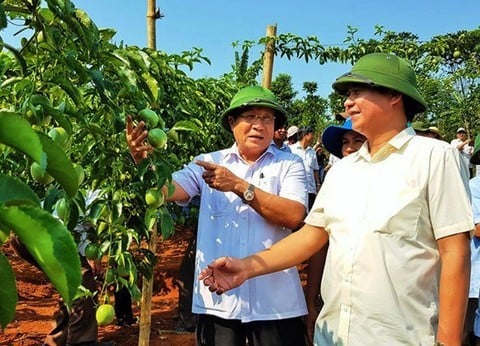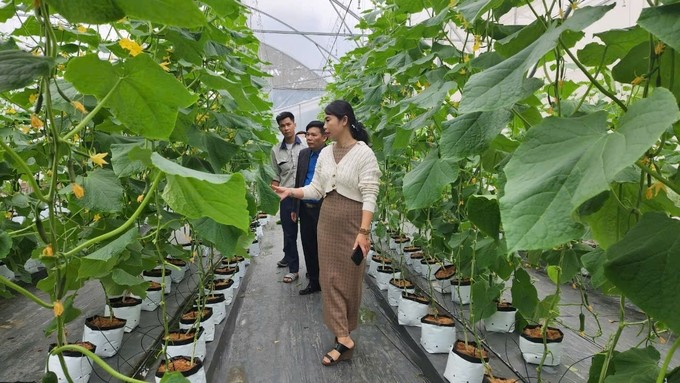May 30, 2025 | 03:46 GMT +7
May 30, 2025 | 03:46 GMT +7
Hotline: 0913.378.918
May 30, 2025 | 03:46 GMT +7
Hotline: 0913.378.918
In the context of globalization and extensive international integration, Vietnam's agricultural sector is facing many challenges, such as climate change, epidemics, increasing requirements on product quality, and fierce competition on the international market.

Deputy Minister of Agriculture and Rural Development Vo Van Hung (right) visits the high-tech passion fruit growing model in Huong Hoa district (Quang Tri). Photo: Nguyen Phuc.
Over the past centuries, Vietnamese agriculture has served as a pillar in the national economy, ensuring food security and creating jobs for the majority of the population. Especially in recent decades, the agricultural sector has achieved many important achievements. Vietnam has become the third largest rice-exporting country in the world, ranked second in coffee exports, been among the top 5 seafood-exporting countries, and reached the export turnover of agricultural-forestry-fishery products of over 62.5 billion USD by 2024.
In addition, the National Target Program on New Rural Construction has helped improve the quality of people's lives, with more than 75% of communes meeting new rural standards and the poverty rate decreasing to less than 3.5%.
However, the small, fragmented production model, depending heavily on the natural factors, makes the agricultural sector vulnerable to climate change and global market fluctuations. This requires a strong shift from agricultural production thinking. It is essential to take the market as a center, increase added value, and promote the application of science and technology for sustainable development.
Facing that situation, switching thinking from "agricultural production" to "agricultural economy" becomes an inevitable requirement, helping the agricultural sector not only exist but also develop sustainably in the long term. This is not only a trend but also a mandatory path if Vietnam wants to build a modern, effective, and competitive agriculture in the international market.
To realize this goal, digital transformation and the application of science and technology are breakthrough solutions. The reality shows that digital transformation helps optimize the entire agricultural production process.
Technologies such as IoT (Internet of Things), AI (Artificial Intelligence), and Big Data allow the collection and analysis of data from the production environment, helping farmers to better control factors affecting productivity and quality of agricultural products.

Digital transformation and the application of science and technology are the driving forces for agricultural economic development today. Photo: Le Hoang Vu.
For example, the IoT sensor system helps monitor soil moisture, temperature, and air quality in real time, thereby adjusting the amount of irrigation water, fertilizer, and pesticides correctly.
Meanwhile, weather forecast models based on AI support planting plans suitable to climatic conditions, minimizing risks and damage. Technologies such as drones and agricultural robots are also widely used in seeding, fertilizing, and harvesting, helping to reduce labor costs as well as increase productivity.
One of the biggest benefits of digital transformation is the ability to optimize the agricultural value chain. Blockchain technology is used to trace products from farm to dining table, ensuring transparency and food safety. This is considered a key factor that helps Vietnamese agricultural products access demanding markets such as the EU, Japan, and the US.
In a different perspective, digital transformation through e-commerce activities also opens new opportunities for Vietnamese agricultural products. Instead of depending on traders or wholesale markets, farmers can directly sell products through online trading floors and e-commerce platforms such as Lazada, Shopee, Amazon, and Alibaba. This helps shorten the supply chain, reduce costs, and increase profits.
Additionally, digital transformation also facilitates the development of smart logistics systems, including modern warehouses, specialized means of transport, and logistics services to support the storage and distribution of agricultural products. This helps reduce the post-harvest loss rate and ensures product quality for consumers.
In fact, digital transformation is not only a great motivation to change agricultural production thinking but also helps promote sustainable production and adapt to climate change. It is also the key to building a green, sustainable, and environmentally friendly agriculture.
Currently, environmental and weather monitoring systems help farmers optimize the use of irrigation water and fertilizer, thereby minimizing the negative impact on the environment. Besides, biotechnology combined with Big Data helps select and develop plant and livestock varieties with drought and salinity tolerance and climate change adaptation. This is an urgent issue for Vietnam, especially in key areas such as the Mekong Delta or some Northern coastal provinces.
Vietnam has great potential and advantages in developing agricultural production, but the process of digital transformation in agriculture also faces many challenges.
First, it is easy to see that there is not synchronized technology infrastructure in many rural areas, especially in remote areas, making it difficult for farmers to access new technology. The lack of digital skills and technological knowledge is also a big barrier when most farmers are not used to operating digital equipment and systems.
In addition, the initial investment cost for high-tech systems is still quite high compared to the financial capacity of many small farmers. The lack of synchronous policy mechanisms and ecosystems to support the digital transformation in agriculture also slows down the conversion process.
To solve these challenges, breakthrough solutions are needed. The first is to invest heavily in digital infrastructure and expand the internet connection to rural areas. At the same time, strengthen digital skills training for farmers and agricultural enterprises through training and technical support programs.
Another very important solution that needs attention is the financial support and preferential credit for farmers and businesses in investing in digital technology.

The process of digital transformation in agricultural production in Vietnam still faces many difficulties. Photo: Dinh Muoi.
Finally, it is necessary to build digital agricultural ecosystems, including technology enterprises, state management agencies, and farmer communities, in order to create a favorable environment for the implementation of new technology solutions.
It can be affirmed that digital transformation and the application of science and technology are not only an inevitable trend but also breakthrough solutions to help Vietnam's agricultural sector escape traditional production thinking towards a modern, sustainable, globally competitive agricultural economy.
The shift from "agricultural production" to "agricultural economy" is not merely changing the production process but also a fundamental change in thinking, from only focusing on output to optimizing the value chain and meeting market demand.
In order to realize this goal, it is necessary to have the cooperation of the Government, businesses, the scientific community, and farmers in building digital platforms, perfecting policies, and creating comprehensive digital agricultural ecosystems. At that time, Vietnam's agricultural sector is not only a pillar of the economy but also a pioneering sector in digital transformation and innovation, contributing to improving people's lives and creating sustainable growth motivation for the country.
Translated by Thu Huyen
/2025/05/25/4127-3-073637_820.jpg)
(VAN) Thanks to the promotion from an FAO-implemented project, vegetable production in greenhouses in Moc Chau has seen strong development, from 1.5 hectares in 2021 to nearly 50 hectares in 2024.

(VAN) FAO has recently supported USD 140,000 to implement the project 'Risk mitigation human-animal interface risks through disease control initiatives in pig farming.'

(VAN) The People's Committee of Tra Vinh province has approved an adjustment to the investment policy for the Green Hydrogen Plant project, increasing its area to approximately 52.76 hectares.
![Reducing emissions from rice fields: [2] Farmers’ commitment to the soil](https://t.ex-cdn.com/nongnghiepmoitruong.vn/608w/files/news/2025/05/05/dsc08881jpg-nongnghiep-140632.jpg)
(VAN) Clean rice cultivation model in Thuong Tan commune, Bac Tan Uyen district, is assisting local residents in achieving sustainable agriculture by substantially reducing costs, increasing productivity, and protecting the environment.

(VAN) At the conference to disseminate Resolution No. 68, AgriS introduced its digital agricultural ecosystem and reaffirmed its commitment to accompanying the Government in promoting private sector development and sustainable agriculture.

(VAN) 'Blue Ocean - Blue Foods' initiative is designed to restore marine ecosystems and establish sustainable livelihoods for local communities by cultivating a minimum of 1,000 hectares of cottonii seaweed in the first three years.
/2025/05/21/4642-3-112707_603.jpg)
(VAN) The V-SCOPE project has made direct contributions to three out of six pillars of the Comprehensive Strategic Partnership between Vietnam and Australia.